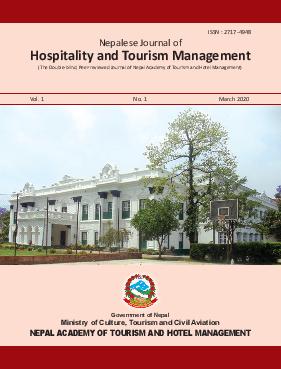Status of Hospitality Education in Nepal: Analysis of the Perspective of Hospitality Students and Practitioners
DOI:
https://doi.org/10.3126/njhtm.v2i1.44396Keywords:
expectation, entrepreneurship intention, hospitality education, hospitality students and practitioners, opportunities and challengesAbstract
Hospitality Management Institutes have seen tremendous growth in the recent years in Nepal. More and more students have shown their inclination to pursue hospitality related courses from the institutes at national level or at different universities or from private institutes. However, the higher education system of this sector has encountered several constraints and challenges that led us to conduct this study to analyse the status of hospitality education in Nepal. The study employed a blend of qualitative and quantitative research method by delivering a descriptive approach as well as undergoing a simple empirical research. The respondents in this study were 180 final year students from bachelor level hotel management colleges and 10 human resource managers from large stale hotels. The study explored the views of students and hotel practitioners about the courses offered, mismatch of expectation, the skills the hospitality graduates possess and the challenges in retaining them in Nepalese industry. The study revealed the existence of mismatch between the expectation and reality from the bachelor in hotel management course. Further, the hotel practitioners also expressed Nepalese hospitality graduates are capable to take the entry level positions and lack the managerial capability to lead the departments and the organisations.
Downloads
Downloads
Published
How to Cite
Issue
Section
License
Copyright (c) 2021 Nepalese Journal of Hospitality and Tourism Management

This work is licensed under a Creative Commons Attribution 4.0 International License.




